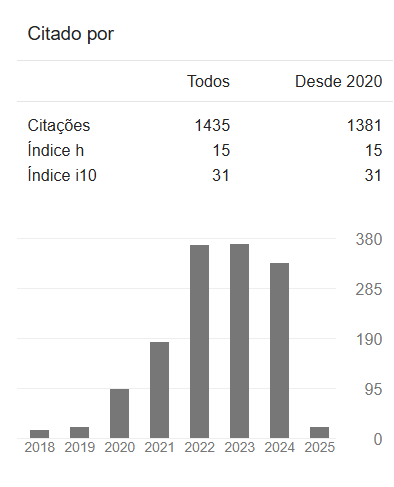MUSICAL EDUCATION IN THE METHODOLOGICAL PERSPECTIVE OF INTERDISCIPLINARY LEARNING
DOI:
10.23926/RPD.2526-2149.2019.v4.n1.p134-153.id305Keywords:
Musical education, Methodology of learning, InterdisciplinarityAbstract
Music education gives the individual access to art, as music, and to knowledge. The present work aims to bring to the field of reflection the need to educate in art / music in an interdisciplinary way adopting the methodologies of musical educators: Emile Jacques Dalcroze; Zoltán Kodály; Carl Orff; Shinichi Suzuki and Keith Swanwick, associated with the "Triangular" approach of Ana Mae Barbosa, proposed in the National Curricular Parameters, (BRASIL, 1997). This proposal consists in teaching art considering the 'do', 'fruir' and 'contextualize' the artistic object. This learning methodology is qualitative because it is a subjective analysis of how much the learner learns. As a result of this association of methodological approaches, add meanings to the educational process and, at the same time, instrumentalize the teaching of Art / music with meanings of other artistic languages, such as dance and visual arts. Moreover, expanding the senses of the contents with a view to a musical education methodologically seated in meaningful learning.
Downloads
Metrics
References
ALVES, Rubem. A alegria de ensinar. 3ª edição, ARS Poética Editora Ltda,1994.
BARBOSA, Ana Mãe (Org.) Inquietações e mudanças no ensino da arte. 2ª ed. São Paulo: Cortez, 2003.
BRASIL. Ministério da Educação e Desporto. Base Nacional Comum Curricular. Brasília: MEC/SEF, 2017.
BRASIL. Ministério da Educação e Desporto. Secretaria de Educação Fundamental. Parâmetros Curriculares Nacionais: arte. Brasília: MEC/SEF, 1997.
BRASIL. Ministério da Educação. Secretaria da Educação Média e Tecnológica. Parâmetros Curriculares Nacionais + (PCN+) - Linguagens, Códigos e suas Tecnologias. Brasília: MEC, 2002.
BRASIL. Lei Diretrizes e Bases da Educação Nacional nº 9.394, de 20 de dezembro de 1997. Disponível em: http://www.planalto.gov.br. Acesso em: 07/02/2019.
BRASIL. Lei n.11.769 de 18 de agosto de 2008. Brasília, DF: MEC/SEF, 2008. Disponível em: http://www.planalto.gov.br. Acesso em: 07/02/2019.
BRASIL. Lei 13.278 de 02 de maio de 2016. Disponível em: http://www.planalto.gov.br. Acesso em: 07/02/2019.
CRUVINEL, Flávia Maria. Efeitos do Ensino Coletivo na Iniciação Instrumental de Cordas: A educação musical como meio de transformação social Goiânia: Dissertação de mestrado - Escola de música e artes cênicas, Universidade Federal de Goiás, 2003.
DALCROZE, Emile Jaques. Le Rythme, La musique et l’éducation. Paris, França: Jobin e Cie,1920.
FERNANDINO, Jussara Rodrigues. Música e cena: uma proposta de delineamento da musicalidade no teatro. Dissertação (Mestrado em Artes) - Escola de Belas Artes, Universidade Federal de Minas Gerais, Belo Horizonte, 2008.
FIALHO, V, M. Ensinando Música na Escola: Conceito, Funções e Práticas Educativas: In: RODRIGUES, Elaine; ROSIN, M.Sheila: Infância e Práticas Educativas. Maringá: Eduem, 2007.
FIGUEIREDO, Sérgio Luiz Ferreira de. A educação musical do século XX: os métodos tradicionais. In: JORDÃO, G.; ALLUCCI, R. R.; MOLINA, S.; TERAHATA, A. Música na escola. São Paulo. Allucci e Associados comunicações, 2012. Disponível em: http://www.amusicanaescola.com.br/o-projeto.html. Acesso em 08 de fevereiro de 2016.
FONTERRADA, Marisa Trench de Oliveira. De tramas e fios: um ensaio sobre música e educação. São Paulo: Editora UNESP, 2 Ed., 2008.
FRANÇA, C.C. O som e a forma: do gesto ao valor. In Ensino de Música: propostas para agir e pensar em sala de aula. Liane Hentschke, Luciana Del Bem, organizadoras. São Paulo: Moderna, 2003.
GIL, Antônio Carlos. Métodos e técnicas de pesquisa social. 6ª ed. São Paulo: Atlas, 2008.
LABAN, Rudolf. Dança Educativa Moderna. São Paulo: Editora Ícone, 1990.
PAZ, Ermelinda A., Pedagogia Musical Brasileira no Século XX. Metodologias e Tendências. Brasilia: Editoda MusiMed, 1949.
SUZUKI, S. Educação é amor. 2ª ed. Santa Maria: Palotti,1994.
SWANWICK, K. A basis for music education. London: Routledge, 1979.
Downloads
Published
How to Cite
Issue
Section
License
Copyright (c) 2023 A Revista Prática Docente tem o direito de primeira publicação

This work is licensed under a Creative Commons Attribution-NonCommercial 4.0 International License.
Authors who publish in this journal agree to the following terms:
- Authors retain the copyright and grant the journal the right of first publication, with the paper simultaneously licensed under the Licença Creative Commons Attribution allows the sharing of the work with acknowledgment of authorship and initial publication in this journal.
- Authors are authorized to take additional contracts separately, for non-exclusive distribution of the version of the work published in this journal (e.g. publish in institutional repository or as a book chapter), with acknowledgment of authorship and initial publication in this journal.











